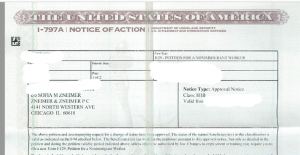The Chicago immigration lawyers of Zneimer & Zneimer handle employment-based immigration and are very familiar with the lengthy priority date line. Many Indian and Chinese people who contribute to the economic engine of our country with knowledge, creativity, and skills, have been stuck for years in an invisible visa line that barely moves forward. These neighbors and friends among us do their job and pay their taxes, but they never stop worrying if their sponsored job will last until the end of the visa line, if a whimsical regulation will deny them H-1B extension and make them out of status, if by the time they reach the end of the line, their minor kids will age out unable to become permanent residents. Many people turn down a well-deserved promotion because it is not the sponsored job, and they need to keep the job with the same title, same description, same company, and work address, until they can file for the last step of the process, adjustment of status.
Priority date. The law presumes that when an employer offers a permanent position to a noncitizen, the employer displaces a U.S. worker. To sponsor a foreign worker, the employer therefore must test the U.S. market for U.S. workers, and only if there are no U.S. workers who are willing, able, qualified, and available to fill the job, the employer can receive a labor certification from the Department of Labor, and then file an immigrant petition on behalf of the foreign worker. In some cases, where the work is in the national interest, the USCIS can waive the test of the U.S. market. Once a petition is filed and approved, the foreign worker receives a “priority date”, which is the date in the Visa Bulletin that shows when a worker can receive his or her green card. The “priority date” is like a number, that places the noncitizen in the visa line, and will be called when the visa becomes available. For people born in India and China, this number is distant and the line is a decade-wait long.
These are legal immigrants, in jobs that U.S. workers were not willing, able, qualified, or available to take, but employers and our economy needed to be filled. They may be doctors in rural and medically underserved areas, software engineers with unique skills, cancer researchers, radiation oncology physicists, and others. All have Bachelor or higher degrees. Due to the per country quota, a janitor born in another country does not have to wait for an immigrant visa, while a Nobel Prize winner from India must wait at least 2.5 years. Immigrants from India with Master Degree, M.D., Ph.D., even when the USCIS has found that their employment is in the national interest, must wait to receive an immigrant visa, or green card, for many years.
Visa Bulletin. That is why, when the State Department published the Visa Bulletin for October 2020, it created a stir. Visas that could not be used due to the pandemic for consular processing, were released for people waiting on the employment line, moving the priority date forward. The category for EB-3 (skilled workers and workers with Bachelor Degrees) moved faster than the category for EB-2 (advanced degrees or petitions in national interest). Continue reading →





